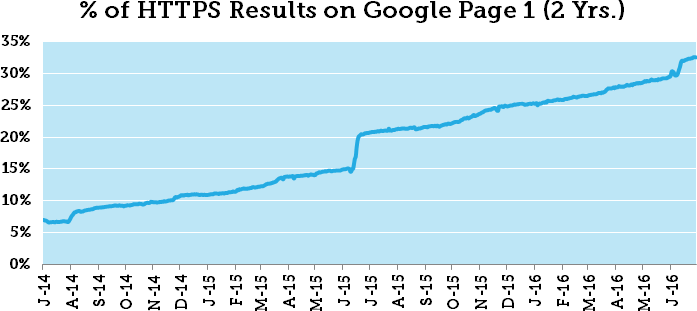It's been two years since Google announced that a secured (HTTPS) connection was a minor ranking signal. While most websites that conduct transactions or have user registrations and other features that involve processing data already utilize an HTTPS connection, law firms rarely do.
HTTP vs HTTPS Simplified
By default your website is accessible via an HTTP connection. With an SSL certificate, you can change your prefix from HTTP to HTTPS. An HTTPS connection adds an extra level of encryption between the user and the server. That's not to say that information exchanged over an HTTP connection is public or easily accessible, it's just not encrypted.
The process of establishing an HTTPS connection is pretty simple for your hosting provider or webmaster. A certificate is issued from a third party and installed on your web hosting environment. Certificates can cost $30 - $2,000 per year. Most law firms are adequately covered with the entry level certificate.
Does HTTPS Improve Rankings?
When Google announced that HTTPS was going to be a minor ranking signal in August of 2014, some sites jumped on board and eagerly waited for the rewards. For most, those rewards never appeared. Your website's position is still based on 200 other factors including links, content, speed and, of course, what your competitors are doing comparatively to you — and HTTPS is only a minor ranking signal.
It wasn't until after the March and May updates that we started seeing HTTPS websites claiming more of a presence at the top of search engine results pages — at least for attorneys. Today, the first page for legal search results contains more HTTPS sites. Some of them are newcomers to the top while others have longstanding positions and have simply updated their sites with SSL certificates.
To get a snapshot of how many HTTPS sites appear in legal search results, we conducted searches in New York, Chicago, Los Angeles, Houston, Atlanta, Tampa, Seattle and Denver. In each city we searched for personal injury, bankruptcy, DUI, family law and estate planning services.
In most cases, we found 2 or fewer HTTPS websites on each page of search results. When our analysts were studying this a few months ago, they made an interesting discovery. Even though the total number of HTTPS sites per page is limited, generally secured websites rank at least mid-page or higher. After making that discovery, we started a network wide upgrade for Custom Legal Marketing clients to get everyone converted to HTTPS.
While it may not be the ranking factor, if it can offer any advantage to our clients, we feel obligated to pursue it.
The Rest of the Web is Catching On
While the legal space is averaging zero to two HTTPS sites per search results page, the rest of web is rapidly catching on. Earlier this week, Moz reported that HTTPS sites now make up 32.5% of page one results on Google.

The chart (courtesy of Moz) shows how Google's announcement has accelerated the adoption of HTTPS over the last two years. At this rate, we can expect at least 50% of first page results to be secured in two years.
What Your Competitors are Not Doing
Our marketing philosophy involves closely monitoring our clients' competitors, learning from what they do and, most importantly, spotting shortcomings. If you can find an opportunity that your competitors are not taking advantage of, you should jump on it. HTTPS is that opportunity. There is a good chance most of your competitors have not updated their websites, which means your firm should seize the opportunity.
After you make the switch, be sure to add the HTTPS site to Google Search Console.

